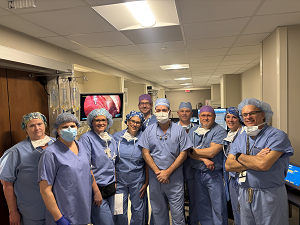Sound Bath and Meditation
Henry Ford Cancer is excited to partner with Detroit health organization The Village Personal Training and Wellness to bring you Sound Bath and...
Thymoma is a rare form of cancer that affects the thymus, a small organ under the breastbone. The thymus produces T-lymphocytes, a type of white blood cells that helps the body fight bacteria and viruses as part of the immune system. The thymus is most active in children and teens, and it shrinks during adulthood.
Thymoma accounts for less than 1 percent of all cancer diagnoses. Because the condition is so rare, not all providers have experience caring for people with thymoma. Our thymoma team is one of the few teams nationwide to perform minimally invasive surgery to remove the thymus (thymectomy). We also offer a Survivorship Workshop Series to support and educate you starting from the moment you receive a thymoma diagnosis.
Your doctor may discover your thymoma after diagnosing you with certain autoimmune disorders, including:
If you have thymoma, you may not notice any unusual symptoms. If you do notice symptoms, they may include:
If your doctor suspects that you have thymoma, you’ll need one or more imaging tests in order to rule in or rule out that diagnosis. These tests let your doctor see whether you have thymoma and, if so, how advanced it may be. Learn more about our thymoma diagnostic process.
Thymectomy is our first line of defense against thymoma. If your thymoma is small enough, you may be a good candidate for a minimally invasive robot-assisted thymectomy. We also use traditional open surgery for patients with tumors that are too large or complex to treat with minimally invasive techniques.
If surgery isn’t an option for you, we use radiation therapy to destroy tumors. Radiation therapy is sometimes an option to relieve symptoms of thymoma, especially if the tumor has spread. Your doctor may recommend chemotherapy as well as part of your treatment plan.
You may be a good candidate for a clinical trial to test new treatments for thymoma. Talk to your doctor about whether taking part in a clinical trial is right for you.
Henry Ford Cancer is excited to partner with Detroit health organization The Village Personal Training and Wellness to bring you Sound Bath and...
Join us each Tuesday for Open Studio, a free-of-charge art therapy group available to cancer patients and survivors where you can spend some...
Music has an incredible ability to soothe the mind and lift the spirit. It can ease pain, calm anxiety, and support healing. If you or someone you...
Join us each Tuesday for Open Studio, a free-of-charge art therapy group available to cancer patients and survivors where you can spend some...

DETROIT — Newly published research conducted in Wayne County, Mich. found that non-smokers, particularly women, who lived near textile and...



We use cookies to improve your website experience. By using this site, you agree to our Terms of Use. Read our Internet Privacy Statement to learn what information we collect and how we use it.